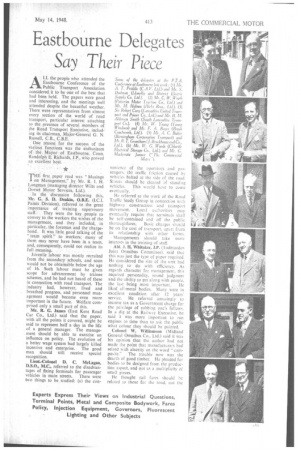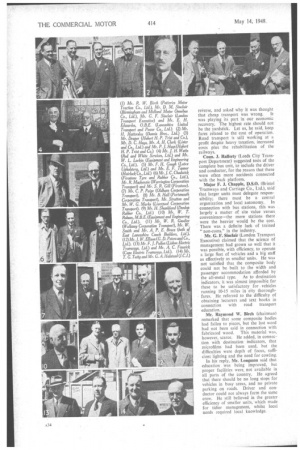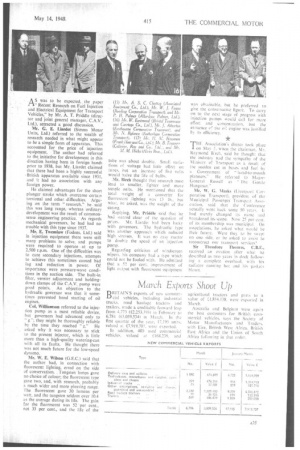Eastbourne Delegates
Page 51

Page 52

Page 53

If you've noticed an error in this article please click here to report it so we can fix it.
Say Their Piece ALL the people who attended the Eastbourne Conference of the Public Transport Association considered, it to be one of the best that had been held. The papers were good and interesting, and the meetings well attended despite the beautiful weather. There were representatives from almost every section of the world of road transport, particular interest attaching to the presence of several members of the Road Transport Executive, including its chairman, Major-General G. N. Russell, CR., C.B.E.
One reason' for the success of the various functions was the enthusiasm of the Mayor. of Eastbourne,. Court. Randolph E. Richards, J.P., Who proved an excellent host.
THE first paper •read was "Musings onManagement," by Mr.. R. I. H. Longman .(managing director Wilts and Dorset Motor Services, Ltd.). . In the -discussion following this, Mr. G. S. D. Deakin, • Q.B.E. (1.C.I. Paints Division), referred to the great importance of training supervisory staff. They were the key people to convey to the workers the wishes of the management, and. they included, in particular,,the foreman and the chargehand. It was little good talking of the "team spirit," to workers; many of them may never have been in a team, and, consequently, could not realize its full meaning.
Juvenile labour was mostly recruited from the secondary schools, and soon would not be obtainable below the age of 16. Such labour must be given scope for advancement by trainee schemes, .and he had not heard of these in connection with road transport. The industry had, however, lived and breathed progress, and personnel management would become even more important in the future. Welfare comprised only a small part of this.
Mr. R. G. James (East Kent Road Car Co., Ltd.) said that the paper, with all the points it covered, might be said to represent half a day in the life of a general manager. The management should be able to exercise an influence on policy. The evolution of a better wage system had largely killed incentive and enterprise.. The good man should still receive special recognition.
Lieut.-Colonel D. C. MeLagan, D.S.O., M.C., referred to the disadvantages of fixing ferminals for passenger
vehicles in main streets, There were two things to be studied: (a) the con
venience of the operators and passengers, (b) traffic friction caused by vehicles halted at the side of the road. Streets should be cleared :A standing
vehicles. This would have to come eventually. • • • He referred to the work of the Road Traffic Study Group in connection with highway construction and transport movement.. Local authorities may eventually require that terminals shall be self-contained and off the public
thoroughfares, Basic charges should be on the cost of transport, apart from its relatiOnship with other forms.
• Managements should take more interests in the training of staff. •
Aid. J. H. Whitaker, J.P. (Todmorden Joint Omnibus Committee), said that this was just the type of paper required. He considered the size. of the unit had nothing to .do with efficiency. As regards character for management, this required personality, sound judgment and the ability to get along with people, the last being most important, lie liked all-metal bodies. Many were in excellent condition after 12 years' service. He referred amusingly to income tax as a Government charge for the privilege of robbing one's fellows. In a dig at the Railway Executive, he said it was more important to run engines, to time than to ask the public what colour they should be painted.
Colonel W. Williamson (Midland General Omnibus Co., Ltd.) said it was his opinion that the, author had not made the point that manufacturers had seized with alacrity on the word "composite," The trouble now was the dearth of good timber. He pleaded for bodies to be designed from the production aspect, and not as a multiplicity of small pieces,
He thought rail fares should be related to those for the road, not the reverse, and asked why it was thought that cheap transport was wrong. It was playing its part in our economic recovery. The highest rate should not be the yardstick. Let us, he said, keep fares related to the cost of operation. Road transport is still working at a profit despite heavy taxation, increased costs plus the rehabilitation of the railways.
Conn. J. Rafferty (Leeds City Transport Department) suggested tests of the complete bus unit, to include the driver and conductor, for the reason that there were often more accidents connected with the back platform.
Major F. J. Chapple, D.S.O. (Bristol Tramways and Carriage Co., Ltd.), said that larger units must delegate responsibility; there must be a central organization and local autonomy. In connection with bus stations, this was largely a matter of site value versus convenience—the more stations there were the heavier would be the cost. There was a definite lack of trained "non-corns." in the industry.
Mr. G. F. Sinclair (London Transport Executive) claimed that the science of management had grown so well that it was possible, with efficiency, to operate a large fleet of vehicles and a big staff as effectively as smaller units. He was not satisfied that the composite body could not be built to the width and passenger accommodation afforded by
the all-metal type. As to destination indicators, it was almost impossible for these to be satisfactory for vehicles running 10-15 miles in city thoroughfares. He referred to the difficulty of obtaining lecturers and text books in connection with road transport education.
Mr. Raymond W. Birch (chairman) remarked that some composite bodies had fallen to pieces, but the last word had not been said in connection with
fabricated wood. This material was, however, scarce. He added, in connection with destination indicators, that microfilms had been used, but the difficulties were depth of focus, sufficient lighting and the need for cowling.
In his reply, Mr. Longman said that education was being improved, but proper facilities were, not available in all parts of the country. He agreed that there should be no long stops for vehicles in busy areas, and no private parking on roads. Driver and conductor could not always form the same crew. He still believed in the greater efficiency of smaller units, which made for tidier management, whilst local needs required local knowledge. AS was to be expected, the paper "Recent Research on Fuel Injectioit and Electrical Equipment for Transport Vehicles," by Mr. A. T. Priddle (director and joint general manager, C.A.V., Ltd.), attracted a good discussion.
Mr. G. E. Liardet (Simms Motor Units, Ltd.) referred to the wealth of research needed in what might appear to be a simple form of apparatus. This accounted for the price of injection equipment. The author had referred to the, initiative for development in this direction having been in foreign hands prior to 1938, but Mr. Liardet claimed that there had been a highly successful -British apparatus available since 1931, and it had no association with any foreign power.
He claimed advantages for the short plunger stroke which overcame certain torsional and other difficulties. Arguing on the term " research," he. said this was long range, whereas ordinary development was the result of cOrnmonsense engineering practice. As regards mechanical governors, he had had no trouble with this type since 1937. Mr. E. Twemlow (Fodens, Ltd.) said in injection equipment there were still many problems to solve, and pumps were required to operate at up to 2,500 r.p.m. One of the difficulties was to cure secondary injections, attempts to achieve this sometimes caused bad lag and reduction in power. Of importance were pressure-wave conditions in the suction side. The built-in filter, vernier adjustment and holdingdown clamps of the C.A.V. pump were good points. An objection to the hydraulic governor was that it sometimes prevented hand starting of oil engines.
Col. Williamson referred to the injection pump as a most reliable device, hut governors had advanced only to " g": they might be thoroughly reliable by the time they reached "z." He asked why it was necessary to stick to the present injector, which is little more than a high-quality watering-can with all its faults. He thought there was not much future for the low-speed dynamo.
Mr. W. E. Wilson (G.E.C.) said that the author, had, in connection with fluorescent lighting, erred on the side of conservatism.. Tungsten lamps gave no choice of colour; the fluorescent type gave two, and, with research, probably a much wider and more pleasing range. The fluorescent gave 30 lumens per watt, and the tungsten seldom over 10.4 as the average during its life. The gain for the fluorescent was 52 per cent., not 33 per cent., and the life of the tube was about double. Small variations of voltage had little effect OTI tunes, hut an increase of five volts would halve the life of bulbs.
Mr. Birch thought that research must lead to smaller, lighter and more simple units. He mentioned that the total weight of a converter for 'fluorescent lighting was 13 lb., but what. he asked, was the weight of the
casing,
Replying, Mr. Priddle said that he had steered 'clear of the question of
prices. Mr. Liardet had been lucky with governors. The hydraulic type was another approach which reduced high stresses. It was no easy matter to double the speed of an injection pump.
Regarding criticism of windscreen wipers, his companyhad a type which could not be fooled with. He admitted that a 52 per cent, improvement of light output with fluorescent equipment
1A,as obtainable, but he preferred to give the conservative figure. To carry on to the next stage of progress with injection pumps would call for more effort and concentration, but the existence of the oil engine was justified by its efficiency.
THE Association's dinner took place on May 5. when the chairman, Mr. Raymond B.rch. said he thought that the industry had the sympathy of the Ministry of Transport as a result of the sudden cut in buses and fuel by a Government of " hand-to-mouth planners." He referred to MaiorGeneral Russell as "'The Gentle Hangman."
Mr. W. G. Marks (Liverpool Corporation Transport).. president of the Municipal Passenger Transport Association, said that the Conference actually went back some 50 years. It had merely changed its name 11 d -broadened its. scope. Now 25 per cent. of its membership was municipal. On associations, he asked what would be their future. Were they to be swept on one side, or be asked to assist to reconstruct our transport services'!
Sir Theodore Thorns, C.B.E., received an ovation after what he described as two years in dock following a complete overhaul. with his radiator running hot and his gaskets blown.




















































































